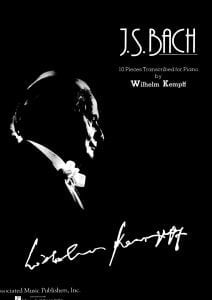Bach, J.S. “Jesu, Joy of Man’s Desiring” (Cantata BWV 147 arranged for piano solo) by Wilhelm Kempff with sheet music
Browse in the Library:
Or browse in the categories menus & download the Library Catalog PDF:
Wilhelm Kempff
Wilhelm Walter Friedrich Kempff (1895–1991) was an archetypal German musician, born into a family of church organists and cantors. The most spiritual Austro–German tradition, from J.S. Bach and Mozart to Beethoven and Schubert, was central to his sensibility, as was the improvisational facility and registral sensitivity of organ playing.
Born in 1895, Kempff grew up in Potsdam, in northeast Germany, though he was studying both composition and piano in Berlin by age nine. Reflecting the essential seriousness of his ambitions, the pianist’s debut Berlin recital, in 1917, paired the virtuosic totems of Beethoven’s “Hammerklavier” Sonata and Brahms’ Paganini Variations. He made his Berlin Philharmonic debut the next year under the iconic Artur Nikisch and went on to perform with the orchestra across six decades.
Kempff made his first recordings in 1920 for Deutsche Grammophon, the beginning of a lifelong relationship with the company that would include two complete cycles of Beethoven’s 32 piano sonatas (in mono and stereo), in addition to an earlier, nearly complete traversal on shellac discs; he also recorded two sets of Beethoven’s five piano concertos and celebrated surveys of Schubert, Schumann and Brahms, plus his own transcriptions of Bach organ pieces. Kempff’s repertoire also included some Liszt and, rare for a German pianist of his era, Chopin.
As a chamber musician, he collaborated with the likes of Henryk Szeryng, Pierre Fournier and Yehudi Menuhin, who cherished the pianist’s “supreme integration of the spontaneous on the one hand and the rigorous on the other.” Kempff lived to age 95, though his later performing career was curtailed by Parkinson’s Disease.
Kempff was neither a daredevil at the keyboard nor one to venerate technique for technique’s sake, his pianism marked above all by clarity of tone, judicious tempos, magical soft playing and a famously lyrical legato. Alfred Brendel, a later pianist influenced by Kempff, valued the elder artist’s improvisational manner, writing that he “played on impulse… It depended on whether the right breeze, as with an aeolian harp, was blowing.”
The New York Times spoke to this quality in a review of his Beethoven: “A poetic subjectivist, Kempff rolls chords, ‘breaks’ hands, pedals through the bar — all at the service of a sustained interpretive imprint that often violates the letter in search of the spirit, and that often impregnates spirit with visual metaphor.” Kempff toured the world, from across Europe to North America and Japan.
In 1934, he arrived in Buenos Aires as a celebrity via the Graf Zeppelin for a tour of South America. Kempff began teaching in the 1920s, in Stuttgart and Potsdam. He then established a school in his adopted Italian town of Positano, giving master classes there until the 1980s, with Mitsuko Uchida, Idil Biret, Gerhard Oppitz, John O’Conor and Jörge Demus among the pianists to carry on his message of subtlety, poetry and humanism.
In 1957, Kempff had traveled to Finland to play for the ailing Sibelius, a great admirer. The composer requested the Adagio from Beethoven’s “Hammerklavier,” saying afterward: “You did not play that as a pianist, but rather as a human being.” —Bradley Bambarger

It was toward the end of his recording career that he at last, turned back to the Bach he was reared on. One might have expected resigned meditation from an old man, but ones gets the spirited probing and underlining of youth. His great legacy was, of course, the two complete cycles of Beethoven sonatas he recorded, first in monophonic and then, with subtle differences, in stereo. His Mozart 23rd Piano Concerto is the finest Mozart I know of. His earlier recording of the 15th Concerto is, perhaps, even better played, though the composition itself is not the masterpiece the 23rd was. Between his Beethoven recordings and his late Bach, Kempff turned to the romantics Schubert and Schumann. His recording of the Schumann Fantasy in C is particularly fine, and his recordings of the Schubert Sonatas truly wafts the listener up into the Empyrean. It is not clear when Kempff made his last recordings. There were several Bach recordings dated by Deutsche Gramophon as 1976, but the dates specify only when the recording engineers made the final mixing of the master tapes, which may have been later than the date the pianist was in the studio. There is a recording of excerpts from Bach's Well-Tempered Klavier which is dated in this way as 1980 and a recording of Mozart's Piano Concerti 21 and 22 dated 1982. But it is just as probable that Kempff retired from making recordings in 1976, when he was eighty-one. He lived until age 95 and died on 1991 May 23 in Positano, Italy, where he had his summer home and taught master classes. Excerpts from one have been preserved on disc. His passing truly marks the end of the days when giants of musicians walked the earth.
